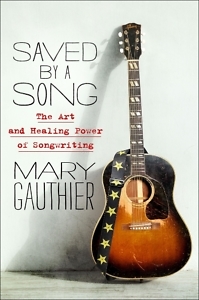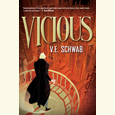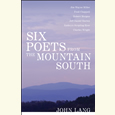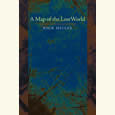You Get What You Need
Mary Gauthier delves into her life and art in Saved by a Song
In Saved by a Song: The Art and Healing Power of Songwriting, Grammy-nominated folk musician Mary Gauthier unpacks her ideas around “what makes a song matter.” This investigation takes us through Gauthier’s personal narrative as a queer woman, a survivor of addiction, and an artist who reaches deep into the wounds of her childhood to reckon with her past traumas through song. Part memoir, part music criticism, the book is a comprehensive guide to songwriting in which Gauthier reveals that to make a song matter, one might need to bare all.

We hear songs all throughout our days, but how often do we actually listen to what they say or how they make us feel? Gauthier writes, “Songs fill the air in grocery stores, salons, airports, malls, cars, elevators, gas stations, restaurants, on TV, and in movies. They are unavoidable, everywhere, all the time. Most float by and nothing important happens. They stay in the background, superficial transactions. But every now and then a song makes us stop what we are doing and listen with our full attention.”
The 59-year-old Louisianan and self-described “troubadour” regularly teaches songwriting masterclasses, and the songs that stay with her are those that hold nothing back. She goes for her students’ guts, rhetorically speaking: “I ask the writers to tell me the story behind [the song], the one they’d tell their best friend late at night over a bottle of wine by candlelight.”
With vulnerability at the crux of her creative process, Gauthier revels in the catharsis of music, encouraging her students to show up as themselves in their art. This is one of the many songwriting proverbs Gauthier shares, and it’s a well-worn lesson for her personally. She writes, “To sound like myself, I had to reveal myself. To reveal myself, I had to be brave.”
Gauthier came to songwriting in her late 20s. She recalls her early years marked by poverty and addiction, living in toxic home environments and struggling to understand her identity as an adoptee. Music always helps her in her “ache of aloneness”: “I’d reach for music to point to emotional pathways I could walk in communion with at least one other person.” Songs like “Sam Stone,” the tragic John Prine song about a Vietnam veteran and heroin addict, and “Mother,” John Lennon’s gut-wrenching song about “maternal abandonment,” are just two she names that meet her in those dark places; she gives these songs her full attention and they give her something in return — a sense of salvation and healing.
 Once Gauthier starts recovering and enters sobriety — “rising from the ashes of addiction by putting words to melody”— she takes what she’s learned from storytellers like Prine and Lennon to heart and quickly finds out that her stories can reach others as well. She shares her healing journey in her AA meetings, and the reaction moves her: “After I told my story, people said they got something from my experiences, something they needed.”
Once Gauthier starts recovering and enters sobriety — “rising from the ashes of addiction by putting words to melody”— she takes what she’s learned from storytellers like Prine and Lennon to heart and quickly finds out that her stories can reach others as well. She shares her healing journey in her AA meetings, and the reaction moves her: “After I told my story, people said they got something from my experiences, something they needed.”
In 2013, a few decades into her career, she participates in a retreat for a non-profit called SongwritingWith:Soldiers, an organization that pairs songwriters with veterans to help them process their experiences in combat. She sits with veterans, asks them questions, helps them feel “seen and heard, not assessed, judged, or evaluated.” She recounts the story of Joe, a former soldier in Iraq, who opens up to her about his experiences, and they cowrite a song called “Rifles and Rosary Beads.” When Gauthier plays the song to a responsive crowd and a beaming Joe, she witnesses the balm of art and “the power of a sad song to make a human being happy.”
The idea of songwriting being utilitarian, something that extends beyond aesthetics and into service, continues to drive Gauthier as a listener and an artist. The intangible “spiritual engagement” that occurs between a listener and a song is what makes a song matter to her, especially when it leads to healing. “Storytellers have power; they are not voiceless victims,” she writes. Gauthier finds her power through song and empowers others to seek it themselves.
Whether they’re longtime fans or newcomers to Gauthier’s work, Saved by a Song gives readers a chance to reflect on the songs that have impacted them. Our experiences as listeners are so intensely personal — all tied up in associations and memories. What first comes to mind for me is “You Can’t Always Get What You Want” by the Rolling Stones. The angelic tone of the choir moved me as an 8-year-old in the backseat of my dad’s car. I’d try to make out Mick’s words in the verses, but all I got were the last lines of the chorus, “You can’t always get what you want, but if you try sometimes, you might find, you get what you need.” Gauthier asserts that songs can be omnipotent; they can close wounds, open doors to empathy, and provide you with what you need. All you have to do is stay open, and listen.
[Read Chapter 16’s 2018 interview with Mary Gauthier here.]

Jacqueline Zeisloft is a writer and editor whose work has appeared in the Nashville Scene and the Women’s Review of Books. She holds a B.A. in English literature from Belmont University and is a graduate of the Columbia Publishing Course. She currently resides in New York City.


